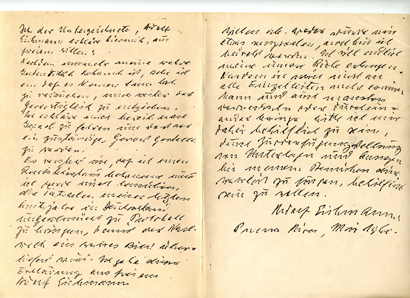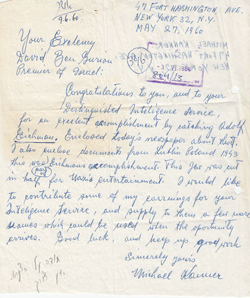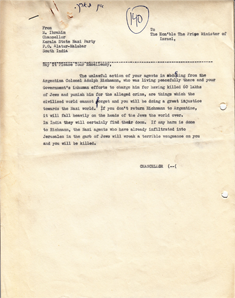- HOME
- EXHIBITION
- Foreword
- Capture
- Portrait
- The State of Israel vs. Adolf Eichmann
- Eichmann on trial
- Verdict
- APPENDIX
- AROUND
THE EXHIBITION - VISITING INFORMATIONS
- FR - EN
Capture
« I hereby declare my readiness to travel to Israel »
On 11 May 1960, in a scene that could have come straight out of a Cold War spy novel, a four-man squad from Mossad, Israel´s foreign intelligence service kidnapped Adolf Eichmann in a Buenos Aires suburb. The head of Israeli secret services, Isser Harel, personally supervised the risky, illegal operation on site. The agents locked Eichmann in a room and questioned him for eight days. The former Nazi soon resigned himself to his fate and signed a letter: «I hereby declare my readiness to travel to Israel to face a court of judgment, an authorized court of law.» On 20 May, half-drugged, the agents bundled him on to an El Al plane, which, after stopping in Dakar, landed in Israel two days later.
Spectacular as it was, the episode was not the conclusion of a relentless manhunt that finally led to success. In reality, neither Jewish leaders or organizations before 1948, nor the new State of Israel, made hunting former Nazis a priority.
However, to strengthen an already shaky sense of national unity and assert the legitimacy of the ruling Labour Party (Mapai), in 1959 Prime Minister Ben-Gurion decided to have Eichmann kidnapped and brought to Israel for trial. From the outset, then, the Eichmann case involved several goals: to see justice done, educate unaware Israeli youth about the Shoah, give the floor to the victims, who had never publicly expressed themselves even though they accounted for nearly a fourth of the Israeli population, and secure the country's future by invoking for the first time, in exceptional circumstances, the memory of the recent catastrophe.

Letter of surrender Adolf Eichmann wrote in Argentina at the Mossad agents' request. 1960.
Shoah Memorial, Paris.
Reactions
Word of Eichmann´s capture set off a wave of emotion. In Israel the overriding feeling was revenge, if not vengeance. The term recurred like a leitmotiv in the street, surveys and political statements. Revenge meant not only the capture of a man who had tried to wipe out the Jewish people, but even more so his trial in Israel. Never had a State that had not existed at the time of a crime whose «own people» had been the victims prosecuted one of those responsible. But controversies broke out on all sides as soon as the announcement of his capture was made. Argentina brought a complaint to the UN Security Council for breach of its sovereignty. On 23 June 1960 the council decided that the breach did take place, and Israel eventually recognized it, but the crimes in question were so serious that it would be difficult not to take them into account.
The trial´s announcement also sparked a legal and moral controversy. A lively debate pitting World Jewish Congress President Nahum Goldman and many prominent intellectuals against David Ben-Gurion and the Israeli government illustrated the dilemmas of an unprecedented legal and political situation. Goldman and the others recommended bringing Eichmann before an international tribunal, which could be set up in Jerusalem, to prevent the trial from being a strictly Jewish affair. The Israeli prime minister adamantly argued that only the Jewish State had the right to try a man whose criminal actions almost exclusively targeted Jews.
The affair set off a wave of popular reactions worldwide. The Israeli government was flooded with letters asking it to torture the accused or, on the contrary, threatening it for having captured him. It awakened memories but also stirred up hatred of Jews, fuelled abhorrence for Israel – still limited at that time – and aroused a disturbing fascination with Nazism.

Letter from Michael Kanner, to Ben-Gurion. 27 May 1960. Contains four original photographs taken in Lublin in 1943: assembly of the Jewish population, humiliation of rabbis, members of the Wehrmacht humiliating two Jews, and a disemboweled Jewish man.
Coll. Israel State Archives

Threat letter, from the Chancellor of the Kerala State Nazi Party.
Coll. Israel State Archives.